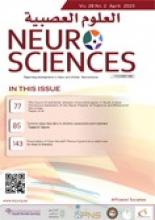ReviewReview Article
Open Access
The consequences of sleep deprivation on cognitive performance
Mohammad A. Khan and Hamdan Al-Jahdali
Neurosciences Journal April 2023, 28 (2) 91-99; DOI: https://doi.org/10.17712/nsj.2023.2.20220108
Mohammad A. Khan
College of Medicine (Khan, Al-Jahdali), King Saud bin Abdulaziz University for Health Sciences, from King Abdullah International Medical Research Center (Khan, Al-Jahdali), and from Department of Medicine, Pulmonary Division, Ministry of National Guard-Health Affairs (Khan, Al-Jahdali), Riyadh, Kingdom of Saudi Arabia.
MD, MRCPHamdan Al-Jahdali
College of Medicine (Khan, Al-Jahdali), King Saud bin Abdulaziz University for Health Sciences, from King Abdullah International Medical Research Center (Khan, Al-Jahdali), and from Department of Medicine, Pulmonary Division, Ministry of National Guard-Health Affairs (Khan, Al-Jahdali), Riyadh, Kingdom of Saudi Arabia.
MD, MRCP
References
- 1.↵
- Lo JC,
- Groeger JA,
- Santhi N,
- Arbon EL,
- Lazar AS,
- Hasan S, et al.
- 2.↵
- Eugene AR,
- Masiak J.
- 3.↵
- Dijk DJ,
- Archer SN.
- 4.↵
- Petrides M,
- Milner B.
- 5.↵
- Yoo SS,
- Gujar N,
- Hu P,
- Jolesz FA,
- Walker MP.
- 6.↵
- Yoo SS,
- Hu PT,
- Gujar N,
- Jolesz FA,
- Walker MP.
- 7.↵
- Killgore WD,
- Killgore DB,
- Day LM,
- Li C,
- Kamimori GH,
- Balkin TJ.
- 8.↵
- Drummond SP,
- Brown GG.
- 9.↵
- Binks PG,
- Waters WF,
- Hurry M.
- 10.↵
- Hernandez PJ,
- Abel T.
- 11.↵
- Gais S,
- Albouy G,
- Boly M,
- Dang-Vu TT,
- Darsaud A,
- Desseilles M, et al.
- 12.↵
- Lopez J,
- Roffwarg HP,
- Dreher A,
- Bissette G,
- Karolewicz B,
- Shaffery JP.
- 13.↵
- Xie M,
- Yan J,
- He C,
- Yang L,
- Tan G,
- Li C, et al.
- 14.↵
- Prince TM,
- Abel T.
- 15.↵
- Florian C,
- Vecsey CG,
- Halassa MM,
- Haydon PG,
- Abel T.
- 16.↵
- Mahboubi S,
- Nasehi M,
- Imani A,
- Sadat-Shirazi M,
- Zarrindast M,
- Vousooghi N, et al.
- 17.↵
- Naidoo N.
- 18.↵
- Hajnik T,
- Tóth A,
- Détári L.
- 19.↵
- Haider B,
- Duque A,
- Hasenstaub AR,
- McCormick DA.
- 20.↵
- Pavlopoulos E,
- Jones S,
- Kosmidis S,
- Close M,
- Kim C,
- Kovalerchik O, et al.
- 21.↵
- Binder JR,
- Frost JA,
- Hammeke TA,
- Bellgowan PS,
- Springer JA,
- Kaufman JN, et al.
- 22.↵
- Aston-Jones G,
- Bloom FE.
- 23.↵
- Araki T,
- Kumagai T,
- Tanaka K,
- Matsubara M,
- Kato H,
- Itoyama Y, et al.
- 24.↵
- Suntsova N,
- Szymusiak R,
- Alam MN,
- Guzman-Marin R,
- McGinty D.
- 25.↵
- Cirelli C,
- Shaw PJ,
- Rechtschaffen A,
- Tononi G.
- 26.↵
- Wang Y,
- Liu H,
- Hitchman G,
- Lei X.
- 27.↵
- Kajimura S,
- Masuda N,
- Lau JKL,
- Murayama K.
- 28.↵
- Fox MD,
- Raichle ME.
- 29.↵
- Chee MW,
- Tan JC,
- Parimal S,
- Zagorodnov V.
- 30.↵
- Tomasi D,
- Wang RL,
- Telang F,
- Boronikolas V,
- Jayne MC,
- Wang GJ, et al.
- 31.↵
- Thomas M,
- Sing H,
- Belenky G,
- Holcomb H,
- Mayberg H,
- Dannals R, et al.
- 32.↵
- Kuhn E,
- Brodan V,
- Brodanová M,
- Rysánek K.
- 33.↵
- Vyazovskiy VV,
- Olcese U,
- Hanlon EC,
- Nir Y,
- Cirelli C,
- Tononi G.
- 34.↵
- Timofeev I.
- 35.↵
- Brown RE,
- Basheer R,
- McKenna JT,
- Strecker RE,
- McCarley RW.
- 36.↵
- Doran SM,
- Van Dongen HP,
- Dinges DF.
- 37.↵
- Rantamäki T,
- Kohtala S. Encoding
- 38.↵
- Gilestro GF,
- Tononi G,
- Cirelli C.
- 39.↵
- Tononi G,
- Cirelli C.
- 40.↵Giuditta A. Sleep memory processing: the sequential hypothesis. Frontiers in systems neuroscience 2014; 8: 219.
- 41.↵
- Tononi G,
- Cirelli C.
- 42.↵Hanson JA HM. Sleep Deprivation. StatPearls [Internet] Treasure Island (FL): StatPearls Publishing; 2023.
- 43.↵
- Lanté F,
- Toledo-Salas JC,
- Ondrejcak T,
- Rowan MJ,
- Ulrich D.
- 44.↵
- Olcese U,
- Esser SK,
- Tononi G.
- 45.↵
- 46.↵
- Voderholzer U,
- Piosczyk H,
- Holz J,
- Landmann N,
- Feige B,
- Loessl B, et al.
- 47.↵
- Antonenko D,
- Diekelmann S,
- Olsen C,
- Born J,
- Mölle M.
- 48.↵
- Iliff JJ,
- Lee H,
- Yu M,
- Feng T,
- Logan J,
- Nedergaard M, et al.
- 49.↵
- Rasmussen MK,
- Mestre H,
- Nedergaard M.
- 50.↵
- Kim YK,
- Nam KI,
- Song J.
- 51.↵
- Shokri-Kojori E,
- Wang GJ,
- Wiers CE,
- Demiral SB,
- Guo M,
- Kim SW, et al.
- 52.↵
- Gunstad J,
- Spitznagel MB,
- Glickman E,
- Alexander T,
- Juvancic-Heltzel J,
- Walter K, et al.
- 53.↵
- Melzer TR,
- Stark MR,
- Keenan RJ,
- Myall DJ,
- MacAskill MR,
- Pitcher TL, et al.
- 54.↵
- Krause AJ,
- Ben Simon E,
- Mander BA,
- Greer SM,
- Saletin JM,
- Goldstein-Piekarski AN, et al.
In this issue
The consequences of sleep deprivation on cognitive performance
Mohammad A. Khan, Hamdan Al-Jahdali
Neurosciences Journal Apr 2023, 28 (2) 91-99; DOI: 10.17712/nsj.2023.2.20220108
Jump to section
Related Articles
- No related articles found.
Cited By...
- No citing articles found.





